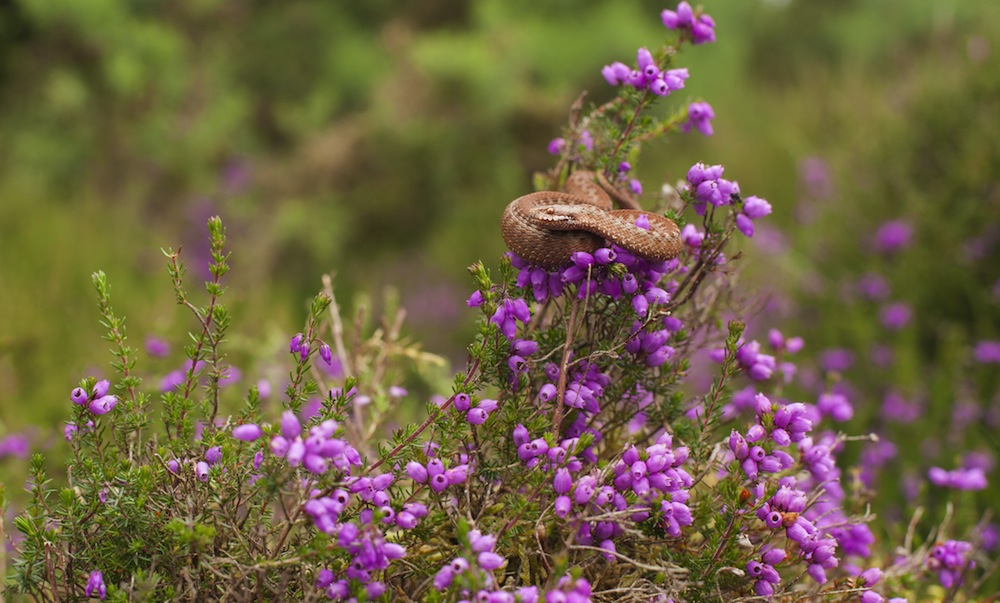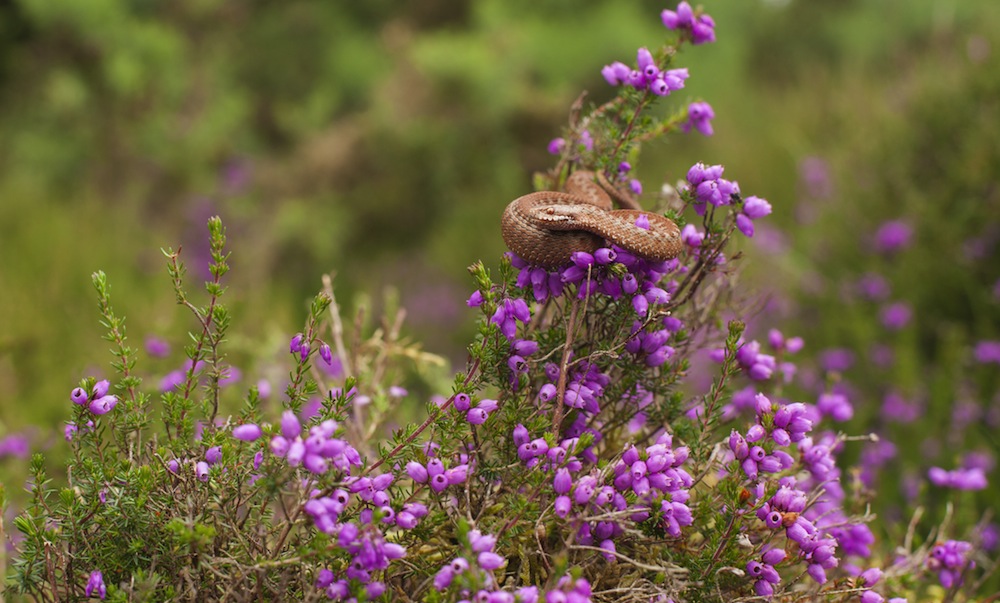
Our wildlife expert Ed Andrews goes in search of adders and reports on a project to relocate slow worms.
This month I’m on the hunt for ancient sun-worshipping beasts that instil fear and fascination in equal measure – and have been doing so for millennia: the earliest known reptiles originated around 315 million years ago.
Basking in the sunlight
It’s a spring day in the Wyre Forest. I walk out along the old railway line past rows of oak trees, which are well spaced out thanks to a long history of woodland management. Bracken crosiers uncurl like swans’ necks. I pass through a gate and emerge onto a sandy, heather-lined path on an open hillside. Over thousands of years, patches of this vast forest have been cleared to create open areas for farming and these are hotspots for local adders, who bask in the sunshine to warm their bodies.
I sit down and scan the land with my binoculars. Adders can sense vibration so it’s vital to sit still when trying to spot them. It’s easy to mistake a bracken frond or a twist of bark for an adder but today there’s no sign of the real thing.
A lively performance
I follow a track deeper into the forest and enter a dramatic theatre, the stage embellished with hawthorn blossom. A pair of colourful mandarin ducks gliding along a small brook is the first act, then the shrill call of a wren bursts into the play and epitomises the urgency and purpose in the air at this time of year. I shut my eyes and imagine the star of the show emerging from behind the curtain of dead bracken, bold zig zag markings on a long sleek body – but nothing. I feel I’m chasing shadows.
Early in my career I was lucky to meet Sylvia who lives in the Wyre Forest. She has spent an inspiring amount of time and effort monitoring the adder population and trying to conserve them. She knows the snakes so well she can identify individuals by their markings, but she has documented a sad decline – there may only be 100 adders left in the whole forest.
Persecuted by humans
Like many creatures, adders have suffered as a result of habitat loss. More worrying is the direct persecution that the snakes have suffered, signalling to me a dark side to the human psyche. Killing a wild animal because of the fear of being bitten exemplifies the human desire to control wildlife and ‘sanitise’ the countryside.
Luckily things are changing: all British reptiles are now protected by law. A local population of slow worms – a type of legless lizard – was threatened by a new housing development. An arrangement with the housing developer saw the animals moved to an area of Severn Valley Country Park and the habitat enhanced to allow sunlight back in and provide log-pile and woodchip shelters.
Through spring and early summer, an ecologist collected the slow worms from the development site and moved them to their new home. When I went to meet him one morning, he was carrying a bucket with two young slow worms inside. I pick one up and he wraps his slender body around my finger. We release them near a log pile and they disappear into the undergrowth.
I hope that when I return to Wyre Forest later in the summer, I’ll find adders slithering through the grass and curled up in the sunshine. I hate to think of this wonderful creature being lost from the forest. There is an alluring mystery surrounding our only venomous snake, and we need a little more mystery in the countryside.
Do one thing for wildlife this month…
Occasionally when I’m leading school groups, I find a grass snake and this is always met with gasps of excitement and wonder from the children. They seem particularly fascinated by snakes and I hope they’ll grow up to respect wildlife and do their bit for conservation. Why not inspire your children or grand-children by encouraging them to join a wildlife group? The RSPB Young Explorers is a good place to start: rspb.org.uk/discoverandenjoynature/families/children. Alternatively, the Woodland Trust Nature Detectives webpage has some great ideas of activities to inspire children: naturedetectives.org.uk






